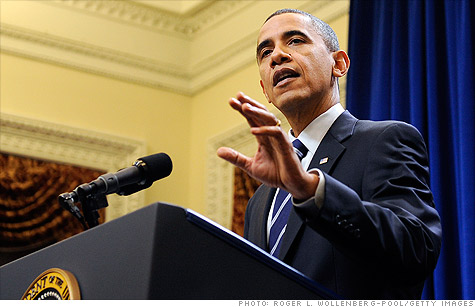 By Jeanne Sahadi, senior writer NEW YORK (CNNMoney.com) -- The compromise on the Bush tax cuts announced Monday night between President Obama and Republicans could cost between $600 billion and $800 billion if ultimately signed into law -- no sure thing given opposition from many Democrats. About half of the measures in the announced package might be considered new short-term stimulus, meaning they may add to the deficits for two more years, but could help maintain the economic recovery and help spur economic activity and job creation. Many economists don't consider an extension of the Bush tax cuts stimulus, because it merely keeps current rates in place. But letting taxes go higher, they say, could impede growth. Several other measures announced Monday do count as stimulus, including a break on how much is deducted from workers' paychecks for Social Security and tax incentives that could encourage businesses to step up their investment. Deficit hawks have been saying that a short-term run-up in debt is acceptable if it is paired with a serious long-term deficit-reduction plan. The proposed deal skips that last part, though the president has said he and his budget team will closely review the recommendations for debt reduction made last week by his debt panel. The administration did not provide a complete accounting of the package, but many of the provisions' costs may be gleaned from cost estimates of similar measures that have been proposed in the past. Bush tax cuts: $458 billion. The package would extend the Bush tax cuts for everyone for two years, including two years of relief for the middle class from the Alternative Minimum Tax. The estimated cost would be $458 billion, according to earlier numbers from the Treasury Department. The cost of extending all the tax cuts over 10 years would have been $3.7 trillion. Unemployment benefits: $57 billion. The package would also leave in place for 13 months the option to file for extended federal unemployment benefits -- which go as high as 99 weeks in states hit hardest by job loss. The Congressional Budget Office recently estimated that a year-long extension would cost $57 billion. Social Security tax break: $120 billion. The package would also offer workers a 2% payroll tax holiday next year, so that instead of paying 6.2% on their first $106,800 of wages, they will only have to pay 4.2%. The White House estimates the measure would cost $120 billion. Individual tax credits: $40 billion. The compromise framework would also extend for two years the increased value of a number of tax credits that benefit low- and middle-income tax filers, such as the earned income tax credit, the child credit and a revamped tax credit for college costs. The measure would cost $40 billion, the administration said. Business tax breaks: Cost unclear. It is still not clear how many business tax breaks are in the package. Some, like an extension of the research and development credit, has drawn bipartisan support and is typically renewed annually. But also included is a new temporary option for businesses to write off 100% of their expenses in 2011. A cost estimate was not immediately available. Estate tax: $88 billion. The compromise framework also includes a lower estate tax, which barring any changes would return in 2011 with a $1 million exemption level and a top rate of 55%. Instead, under the proposal, the exemption level would be raised to $5 million and the top rate lowered to 35%. The administration said it didn't have a cost estimate yet, but a review of an estate tax proposal with similar parameters by the Tax Policy Center suggests the cost could be roughly $88 billion over 2 years. Paying as they go? Of course, the cost of the combined provisions could be reduced if lawmakers choose to follow their own rules to pay for any new tax cuts or spending increases by finding additional revenue or cutting spending elsewhere in the budget. But it's likely that few, if any, of the measures in the compromise framework will end up being paid for. One reason is that some of the measures -- like extending the Bush tax cuts for the middle class -- are already exempt from the so-called "pay-go" rules. Another reason is that many of the other measures -- such as the payroll tax holiday and the unemployment benefits extension -- will be deemed emergency spending. |
Wednesday, December 8, 2010
Tax cut deal and surprise stimulus - the cost
Label:
USD Watch
No comments:
Post a Comment